#mondo 2000 magazine
Explore tagged Tumblr posts
Text

MONDO 2000: #12 [1994]
229 notes
·
View notes
Text

Mondo 2000 Magazine issue n°14 (1995) Photography By: Tom Pitts
325 notes
·
View notes
Text




Mondo 2000 Magazine 1992 Iss. 7
9 notes
·
View notes
Text

Mondo 2000
Magazine Issue 10
1993
RU a Cyberpunk
p30
164 notes
·
View notes
Text
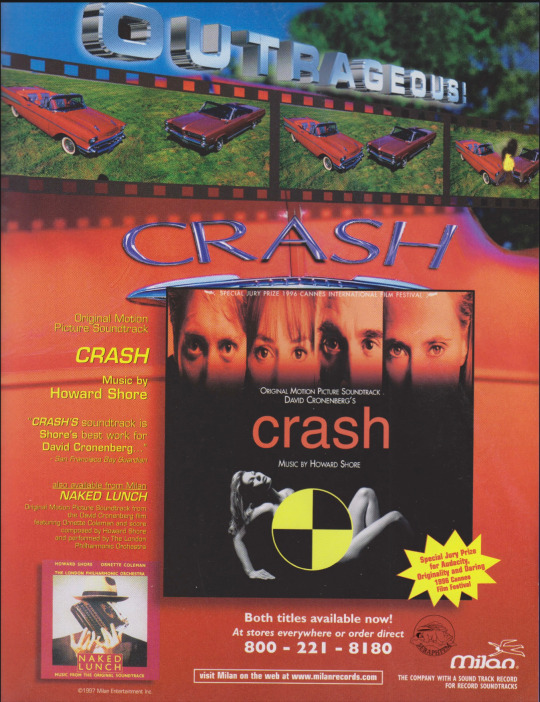
Vintage advertisement for the soundtrack to David Cronenberg’s CRASH, as seen in Issue 16 of Mondo 2000, c. 1996
240 notes
·
View notes
Text

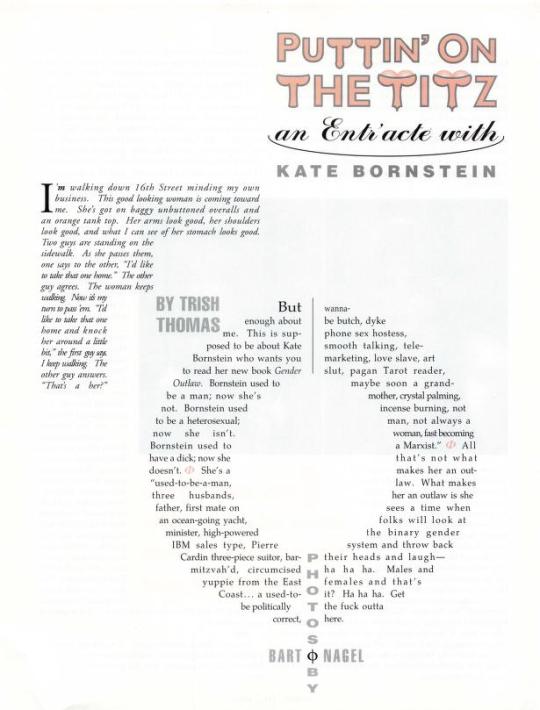
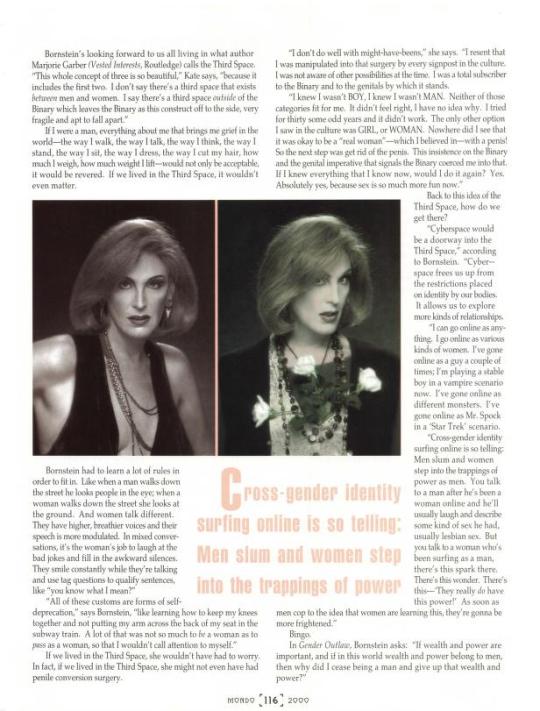
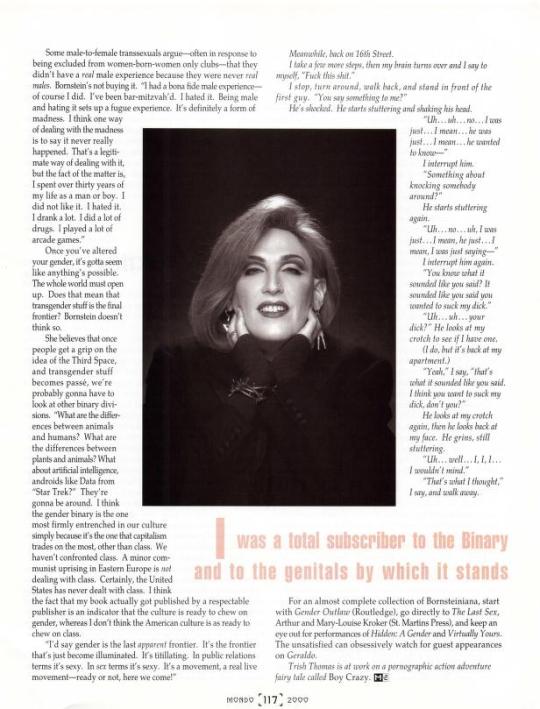
Interview with nonbinary trans author Kate Bornstein, promoting her book Gender Outlaw (Mondo 2000 #13, 1995)
Full text under cut
I‘m walking down 16th Street minding my own business. This good looking woman is coming toward me. She's got on baggy unbuttoned overalls and an orange tank top. Her arms look good, her shoulders look good, and what I can see of her stomach looks good. Two guys are standing on the sidewalk. As she passes them, one says to the other, “I'd like to take that one home.” The other guy agrees. The woman keeps walking. Now it's my turn to pass 'em. “I'd like to take that one home and knock A her around a little bit,” the first guy says. I keep walking. The other guy answers. “That's a her?”
But enough about me. This is supposed to be about Kate Bornstein who wants you to read her new book Gender Outlaw. Bornstein used to be a man; now she’s not. Bornstein used to be a heterosexual; now she isn't. Bornstein used to have a dick; now she doesn’t.
She’s a “used-to-be-a-man, three husbands, father, first mate on an ocean-going yacht, minister, high-powered IBM sales type, Pierre Cardin three-piece suitor, bar-mitzvah’d, circumcised yuppie from the East Coast… a used-to-be politically correct, wanna-be butch, dyke phone sex hostess, smooth talking, telemarketing, love slave, art slut, pagan Tarot reader, maybe soon a grandmother, crystal palming, incense burning, not man, not always a woman, fast becoming a Marxist.”
All that’s not what makes her an outlaw. What makes her an outlaw is she sees a time when folks will look at the binary gender system and throw back their heads and laugh— ha ha ha. Males and females and that’s it? Ha ha ha. Get the fuck outta here.
Bornstein’s looking forward to us all living in what author Marjorie Garber (Vested Interests, Routledge) calls the Third Space. “This whole concept of three is so beautiful,” Kate says, “because it includes the first two. I don’t say there’s a third space that exists between men and women. I say there’s a third space outside of the Binary which leaves the Binary as this construct off to the side, very fragile and apt to fall apart.”
If I were a man, everything about me that brings me grief in the world—the way | walk, the way I talk, the way I think, the way | stand, the way I sit, the way I dress, the way | cut my hair, how much I weigh, how much weight I lift—would not only be acceptable, it would be revered. If we lived in the Third Space, it wouldn't even matter.
Bornstein had to learn a lot of rules in order to fit in. Like when a man walks down the street he looks people in the eye; when a woman walks down the street she looks at the ground. And women talk different. They have higher, breathier voices and their speech is more modulated. In mixed conversations, it’s the woman's job to laugh at the bad jokes and fill in the awkward silences. They smile constantly while they’re talking and use tag questions to qualify sentences, like “you know what I mean?”
“All of these customs are forms of self-deprecation,” says Bornstein, “like learning how to keep my knees together and not putting my arm across the back of my seat in the subway train. A lot of that was not so much to be a woman as to pass as a woman, so that I wouldn't call attention to myself.”
If we lived in the Third Space, she wouldn't have had to worry. In fact, if we lived in the Third Space, she might not even have had penile conversion surgery.
“I don’t do well with might-have-beens,” she says. “I resent that I was manipulated into that surgery by every signpost in the culture. I was not aware of other possibilities at the time. I was a total subscriber to the Binary and to the genitals by which it stands.
“I knew I wasn’t BOY, I knew I wasn’t MAN. Neither of those categories fit for me. It didn’t feel right, I have no idea why. I tried for thirty some odd years and it didn’t work. The only other option I saw in the culture was GIRL, or WOMAN. Nowhere did I see that it was okay to be a “real woman”—which I believed in—with a penis! So the next step was get rid of the penis. This insistence on the Binary and the genital imperative that signals the Binary coerced me into that. If I knew everything that I know now, would I do it again? Yes. Absolutely yes, because sex is so much more fun now.”
Back to this idea of the Third Space, how do we get there?
“Cyberspace would be a doorway into the Third Space,” according to Bornstein. “Cyberspace frees us up from the restrictions placed on identity by our bodies. It allows us to explore more kinds of relationships.
“I can go online as anything. I go online as various kinds of women. I've gone online as a guy a couple of times; I’m playing a stable boy in a vampire scenario now. I’ve gone online as different monsters. I’ve gone online as Mr. Spock in a ‘Star Trek’ scenario.
“Cross-gender identity surfing online is so telling: Men slum and women step into the trappings of power as men. You talk to a man after he’s been a woman online and he'll usually laugh and describe some kind of sex he had, usually lesbian sex. But you talk to a woman who's been surfing as a man, there’s this spark there. There’s this wonder. There's this—'They really do have this power!’ As soon as men cop to the idea that women are learning this, they’re gonna be more frightened.”
Bingo.
In Gender Outlaw, Bornstein asks: “If wealth and power are important, and if in this world wealth and power belong to men, then why did I cease being a man and give up that wealth and power?"
Some male-to-female transsexuals argue—often in response to being excluded from women-born-women only clubs—that they didn’t have a real male experience because they were never real males. Bornstein’s not buying it. “I had a bona fide male experience—of course I did. I’ve been bar-mitzvah’d. I hated it. Being male and hating it sets up a fugue experience. It’s definitely a form of madness. | think one way of dealing with the madness is to say it never really happened. That’s a legitimate way of dealing with it, but the fact of the matter is, I spent over thirty years of my life as a man or boy. I did not like it. I hated it. I drank a lot. I did a lot of drugs. I played a lot of arcade games.”
Once you've altered your gender, it’s gotta seem like anything’s possible. The whole world must open up. Does that mean that transgender stuff is the final frontier? Bornstein doesn’t think so.
She believes that once people get a grip on the idea of the Third Space, and transgender stuff becomes passé, we're probably gonna have to look at other binary divisions. “What are the differences between animals and humans? What are the differences between plants and animals? What about artificial intelligence, androids like Data from “Star Trek?” They're gonna be around. | think the gender binary is the one most firmly entrenched in our culture simply because it’s the one that capitalism trades on the most, other than class. We haven't confronted class. A minor communist uprising in Eastern Europe is not dealing with class. Certainly, the United States has never dealt with class. I think the fact that my book actually got published by a respectable publisher is an indicator that the culture is ready to chew on gender, whereas I don’t think the American culture is as ready to chew on class.
“I'd say gender is the last apparent frontier. It’s the frontier that’s just become illuminated. It’s titillating. In public relations terms it’s sexy. In sex terms it’s sexy. It’s a movement, a real live movement—ready or not, here we come!”
Meanwhile, back on 16th Street.
I take a few more steps, then my brain turns over and I say to myself, “Fuck this shit.”
I stop, turn around, walk back, and stand in front of the first guy. “You say something to me?”
He’s shocked. He starts stuttering and shaking his head.
“Uh…uh…no…I was just…I mean…he was just…I mean…he wanted to know—"
I interrupt him.
“Something about knocking somebody around?”
He starts stuttering again.
“Uh…no…uh, I was just… I mean, he just… I mean, I was just saying—"
I interrupt him again.
“You know what it sounded like you said? It sounded like you said you wanted to suck my dick.”
“Uh…uh… your dick?” He looks at my crotch to see if I have one.
(I do, but it’s back at my apartment.)
“Yeah,” I say, “that’s what it sounded like you said. I think you want to suck my dick, don't you?”
He looks at my crotch again, then he looks back at my face. He grins, still stuttering.
Uh...well...I, I, I... I wouldn't mind.”
“That's what I thought,” I say, and walk away.
For an almost complete collection of Bornsteiniana, start with Gender Outlaw (Routledge), go directly to The Last Sex, Arthur and Mary-Louise Kroker (St. Martins Press), and keep an eye out for performances of Hidden: A Gender and Virtually Yours. The unsatisfied can obsessively watch for guest appearances on Geraldo.
#was looking at old cyberpunk magazines and this one just happened to have an interview with bornstein in it what a treat 😊#warning for some dated editorializing as you can imagine but its still cool to see where gender politics were three decades ago#kate bornstein#gender outlaw#mondo 2000#///
40 notes
·
View notes
Text
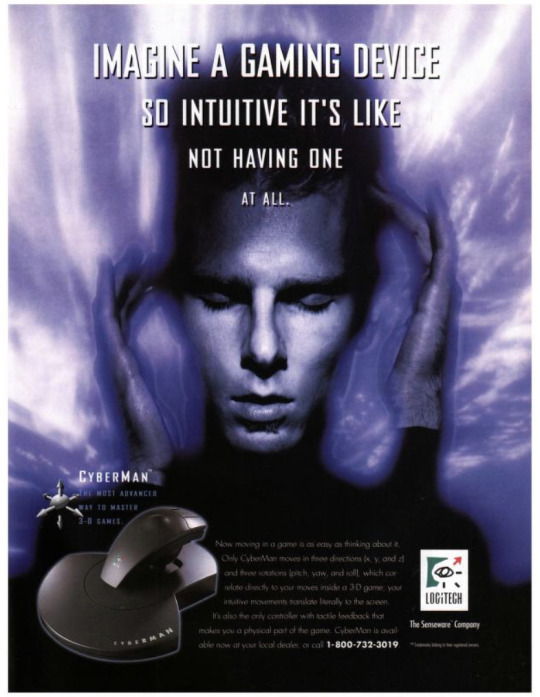
Logitech CyberMan advertisement (Mondo 2000 magazine, 1993)
#techcore#cybercore#tech aesthetic#cyber aesthetic#1993#90s nostalgia#90s aesthetic#90s tech#logitech#logitech cyberman#retro futurism#retro gaming#retro video games#retro tech#retro technology#vintage tech#mondo 2000#mondo magazine
364 notes
·
View notes
Text

Mondo 2000, 1997
Source
4 notes
·
View notes
Text
https://www.metamute.org/editorial/articles/californian-ideology
There is an emerging global orthodoxy concerning the relation between society, technology and politics. We have called this orthodoxy `the Californian Ideology' in honour of the state where it originated. By naturalising and giving a technological proof to a libertarian political philosophy, and therefore foreclosing on alternative futures, the Californian Ideologues are able to assert that social and political debates about the future have now become meaningless. The California Ideology is a mix of cybernetics, free market economics, and counter-culture libertarianism and is promulgated by magazines such as WIRED and MONDO 2000 and preached in the books of Stewart Brand, Kevin Kelly and others. The new faith P has been embraced by computer nerds, slacker students, 30-something capitalists, hip academics, futurist bureaucrats and even the President of the USA himself. As usual, Europeans have not been slow to copy the latest fashion from America. While a recent EU report recommended adopting the Californian free enterprise model to build the 'infobahn', cutting-edge artists and academics have been championing the 'post-human' philosophy developed by the West Coast's Extropian cult. With no obvious opponents, the global dominance of the Californian ideology appears to be complete. On superficial reading, the writings of the Californian ideologists are an amusing cocktail of Bay Area cultural wackiness and in-depth analysis of the latest developments in the hi-tech arts, entertainment and media industries. Their politics appear to be impeccably libertarian - they want information technologies to be used to create a new `Jeffersonian democracy' in cyberspace in its certainties, the Californian ideology offers a fatalistic vision of the natural and inevitable triumph of the hi-tech free market.
from "The Californian Ideology" by Richard Barbrook and Andy Cameron, 1 September 1995
#the californian ideology#mute magazine#Richard Barbrook#Andy Cameron#technological determinism#from 1995 folks
132 notes
·
View notes
Text
it is time to be old on the internet: TFP Ratchet's hatred of 2010 era human tech is hilarious
every time Ratchet complains about shitty human technology in TFP, it's so funny to me, that shit is so good
because, I mean, I grew up with the first computer in my house being a fucking Tandy 1000, which to be fair wasn't exactly the hottest model even then, but still LMAO
the first modem I ever messed with as a kid was the wood box phone receiver type, the acoustic coupler ones, which was my dad's, and he only had it because his job at a local university meant he could borrow one from their tech lab (so we didn't technically own it)
if I remember correctly, the one we had ran at 300 baud, which was fucking amazing for such a set up at the time. slightly later AOL dial up looked like lightning speed compared to that shit.
my first chat rooms were BBS/Usenet (whenever I could connect) and IRC chats. now everyone has Discord and I still don't understand how that shit works lmao but that's more of a me problem and less of an age problem, I think
we got dial up (in the "modern" sense of it being AOL dial up service with the infamous hell noises) in my household in 1994, back when it was pretty much a brand new thing (at least for AOL), and I remember the Eternal September Usenet rush, lmao
imagine if TFP took place in the 80s/90s, oh my god
(I'm assuming TFP takes place in roughly 2010 because that's when the show premiered, and Miko has some kind of Razr-inspired flip phone, so if we assume it's supposed to be based on the first model of Razr, then at the earliest that places the show in 2004)
Ratchet would have gone completely insane with old school internet capable consumer level human tech
Ratchet: "How do I look at photos on this monitor?"
80s Raf: "what"
Ratchet: "what"
oh god now I want an 80s/90s TFP AU so fucking bad. imagine 80s Raf. it's so good
oh god, IMAGINE 90s RAF. just getting traumatised by terrifying shitty mid-90s FMV horror games. this poor boy. but imagine his hype when the PS1 would come out in the USA in 1995. the hype would be so fucking real. lmao
also for those of you who are Younger and Blessed With Good Internet From An Early Age, if you want a good idea of old school internet shit, go ahead and watch WarGames (1983) and look up 2600 Magazine and Mondo 2000 if you don't already know about those.
(personally I consider WarGames and Hackers (1995) to be the two best simultaneously dumbest and best movie depictions of computer bullshit in their respective eras, although Hackers was more of a thing that informed cyber culture after it released rather than reflecting actual hacker culture as it was at that exact time but anyway, please watch them if you have not seen them already, you will love this shit lmao)
I assume almost all of you already know about this stuff, but just in case, I want to mention it. those two movies are really good. lol
anyway, Ratchet dealing with early internet. early shitty human tech. or at least the 90s shit. imagine Ratchet having to listen to the fucking dial up screeching. the kids having to look through geocities webrings to see if any images of the bots had been leaked on any conspiracy websites. just 10/10 lmaooo
"I hate talking to machines" Ratchet, buddy, you have NO IDEA how bad it could have been!!!
anyway I'm old, I guess that's the point of this post LOL
93 notes
·
View notes
Text

MONDO 2000: #12 [1994]
142 notes
·
View notes
Note
would you happen to have any scans of the cyberpunk magazine mondo 2000? thank you, apologies for the bother ^_^
amazing issue and cool photography but nope, users on archive.org uploaded a ton of scans for that magazine so u can view some there
21 notes
·
View notes
Text
[✎ ITA] Weverse Magazine : Recensione : Le Canzoni, il Ballo e la Strada di j-hope | 04.05.24⠸
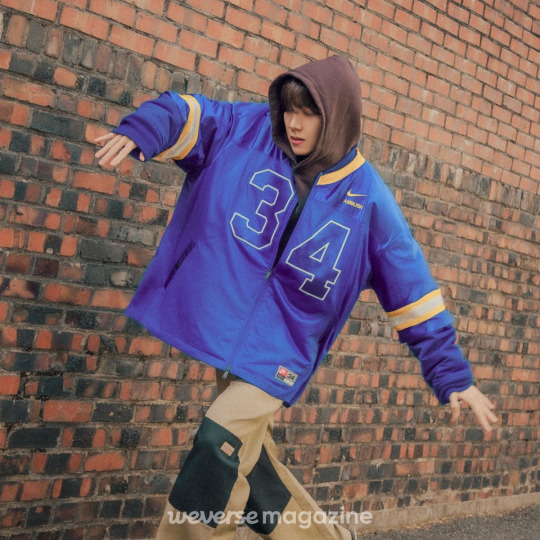
🌟 Weverse Magazine 🗞
Le Canzoni, il Ballo e la Strada di j-hope
__ Una recensione di HOPE ON THE STREET VOL.1 __
__ di KANG ILKWON | 04. 05. 2024
Twitter | Orig. KOR
Nonostante la sua ascesa al successo da superstar globale insieme ai BTS, l'identità di j-hope continua fondamentalmente a gravitare attorno la street dance. L'ultimo album dell'artista, HOPE ON THE STREET VOL.1, è testimonianza dell'incrollabile connessione che ancora lo lega al mondo del ballo. Il rilascio di questo progetto è pubblicizzato come “special album (album speciale)” e la scelta del format in cui si presenta non poteva essere più azzeccata. L'album comprende sia nuove tracce che nuove versioni di alcune delle canzoni più amate tra quelle già rilasciate, come la versione solista di “on the street”—che era, in origine, una collaborazione con J. Cole—ed un remix di “what if…”
Per gli estimatori sia di nuove versioni e remix di brani pubblicati in precedenza che di tracce nuove di zecca, quest'album presenta la tracklist perfetta.
youtube
La traccia che probabilmente susciterà più interesse è “NEURON”, in collaborazione con i talentuosissimi artisti hip hop coreani, Gaeko e yoonmirae i quali aggiungono un ulteriore, allettante strato di rap al brano. J-hope apre la traccia con il suo roco rap, catturando immediatamente l'attenzione di chi ascolta, con punte maestrali da parte di Gaeko - con la sua flow fitta e tagliente – ed il rap euforizzante di yoonmirae, in chiusura.
Il titolo, “NEURON”, è un triplo gioco di parole che allude 1) ai neuroni, le cellule del sistema nervoso, 2) al nome della crew di ballo di cui faceva parte j-hope e, 3) alle parole “New run” che troviamo nel testo – a loro volta allusione ad un nuovo inizio.
La produzione del brano ha un che di mozzafiato. In apparenza, è simile a “on the street”, ma l'arrangiamento, più ricco, riesce a distinguerla con il suo connubio di sound boom bap – tipico dell'hip hop della East Coast degli anni '90 e 2000 – e pop rap melodico. Nel ritornello troviamo anche la talk box, un sound comunemente tipico dell'hip hop della West Coast. Non mancano poi intriganti variazioni ritmiche e di flow nei versi che precedono il rap di yoonmirae. Grazie a questi e molti altri accenti coinvolgenti – come i riff di tastiera che, a cascata, scivolano via dal ritornello pop accompagnando il passaggio ad un nuovo beat - questo singolo è un'impareggiabile lettera d'amore di j-hope per l'hip hop.
youtube
“i wonder…”, in cui troviamo anche il collega dei BTS, JungKook, è un magistrale mix di funk ed electro-pop. Supportati da una produzione ed un sound allegri e ritmati, il rap cantato in autotune da j-hope e la voce melodiosa di JungKook esprimono con risolutezza il loro amore e la loro fiducia per le/i fan, nonché – rafforzato dal viaggio musicale affrontato insieme, l'affetto per il gruppo, in quello che è un tributo particolarmente toccante a tuttə coloro che li hanno seguiti finora.
Subito dopo questa traccia, troviamo “lock / unlock” (with benny blanco and Nile Rodgers) e la sua disposizione nella tracklist è un vero colpo di genio perché tale collocazione enfatizza la base funk che caratterizza i due brani.
youtube
Sebbene “lock / unlock” sia più ballabile, nonché più vicina a ciò che comunemente viene definito funk, le due tracce trovano un punto di incontro nell'orchestrazione delle sezioni ritmiche, le quali riescono a dare l'impressione che i due brani non siano altro se non due parti di una stessa canzone, tratteggiando però atmosfere diverse attraverso ritmi differenti.
La voce del poliedrico artista Benny Blanco e la chitarra di Nile Rodgers, leggenda vivente del soul/funk, complementano perfettamente il cantato di j-hope, rendendo la traccia particolarmente adrenalinica. Queste due canzoni, collocate una di seguito all'altra, contribuiscono ad incrementare gradualmente il ritmo dell'album, fino a culminare nel brano successivo, “i don’t know” with HUH YUNJIN of LE SSERAFIM. La patinata perfomance deep house di j-jope e l'incantevole monologo francese nonché voce di HUH YUNJIN sono splendidi.
youtube
Le nuove versioni incluse in quest'album regalano agli ascoltatori scelte sonore che solo un progetto come questo – così diverso dai soliti album in studio—poteva presentare.
La versione solista di on the street” che troviamo nel VOL.1 vede j-hope colmare la strofa di J. Cole con nuovi, geniali versi rap, i quali permettono all'artista di amplificare ancor più il suo messaggio. La versione solista è un omaggio alla street dance, ovvero le radici di j-hope in quanto idol, le tappe superate lungo il percorso, l'ispirazione che continua a spingerlo verso nuovi obiettivi, nonché un omaggio alla strada in quanto maestra di vita; tutto questo confezionato in una nuova versione che dà così alle/i fan l'opportunità di ri-sperimentare un brano cui hanno già dimostrato tanto amore. Il verso più eccezionale ci è offerto proprio da quelle nuove parti di testo: “Conoscere il cammino e percorrerlo è diverso”. A volte, nel corso della nostra vita, pensiamo di sapere come raggiungere ciò che vogliamo—come realizzare i nostri sogni—ma, di fatto, mettere in pratica quei progetti è tutta un'altra storia. È un verso molto breve, ma rimane nel cuore.
youtube
L'amatissima “What if…”, già rilasciata nel 2022 nell'album Jack In The Box, trova qui nuova vita sotto forma di dance mix grazie alla ri-masterizzazione dell'iconico sample “Shimmy Shimmy Ya” di Ol’ Dirty Bastard in un botta e risposta giocato tra hip hop in stile New Yorkese ed elettronica sopra le righe, senza tuttavia discostarsi dall'alta tensione offerta dalla traccia originale. La novità, in questo remix, è rappresentata dal contributo del cantautore e produttore JINBO, le cui aggiunte sono sì di supporto alla visione creativa di j-hope, ma rappresentano anche un a-parte fresco ed inedito. Ma prendiamoci qaualche istante per approfondire un po' di più la conoscenza di JINBO. Quest'ultimo è uno dei pochissimi artisti coreani che ha davvero saputo cogliere ed interpretare il neo soul e l'hip hop e che ha saputo trarne il massimo, incorporandoli in una carriera musicale costantemente a cavallo tra hip hop/R&B e K-pop. La sua voce, morbida e ricca di sentimento, serve ad alleggerire la parte conclusiva di una canzone fino a quel momento caratterizzata dai velocissimi rap di j-hope e da un beat grintoso e graffiante.
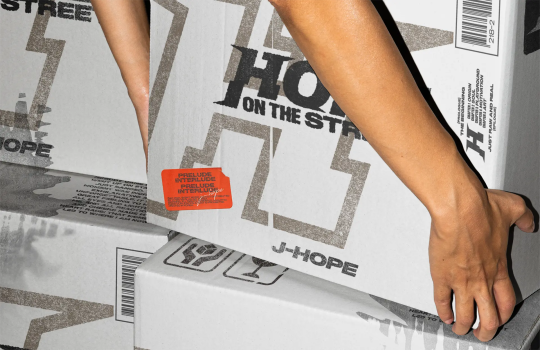
HOPE ON THE STREET VOL.1 è un esempio magistrale di come sia possibile arrivare ad un pubblico di massa pur esplorando a fondo generi solitamente più di nicchia.
I messaggi che l'ambizioso j-hope ha voluto trasmetterci attraverso quest'album sono fondamentalmente semplici, testimonianza della sua sincerità— l'eterno amore per le sue radici nella street dance, l'orgoglio per il suo status di ballerino, il rispetto e la dedizione per il rap/hip hop nonché il profondo affetto nutrito per le/i fan che l'hanno sempre supportato—Ne è, infatti, intrisa ogni nota in ognuna delle canzoni contenute nell'album, forti di quelle sue umili aspirazioni.
E subito ci torna in mente Bong Joon Ho, quella volta che, notoriamente, ha citato Martin Scorsese durante gli Oscar: “Più una cosa è personale più sarà creativa.” L'intenzione di j-hope non è ostentare il suo apprezzamento per la street dance o l'hip hop, ma l'artista non dimentica mai quali sono le sue origini e non fa che ricordare a se stesso—gioiosamente, apertamente e in tutta onestà—qual è il tipo di percorso che sta affrontando.
⠸ ita : © Seoul_ItalyBTS ⠸
#Seoul_ItalyBTS#Traduzione#TradITA#ITA#Recensione#BTS#방탄소년단#jhope#제이홉#Hope_On_The_Street_Vol1#WeverseMagazine#HopeOnTheStreet#040524#Youtube
2 notes
·
View notes
Photo

R.U. a Cyberpunk? From Mondo 2000 magazine (1993) via cassettefuturism
13 notes
·
View notes
Text
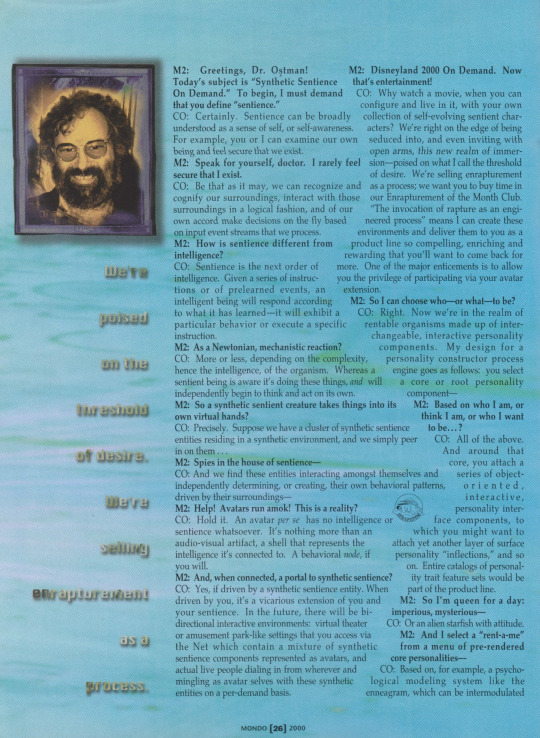
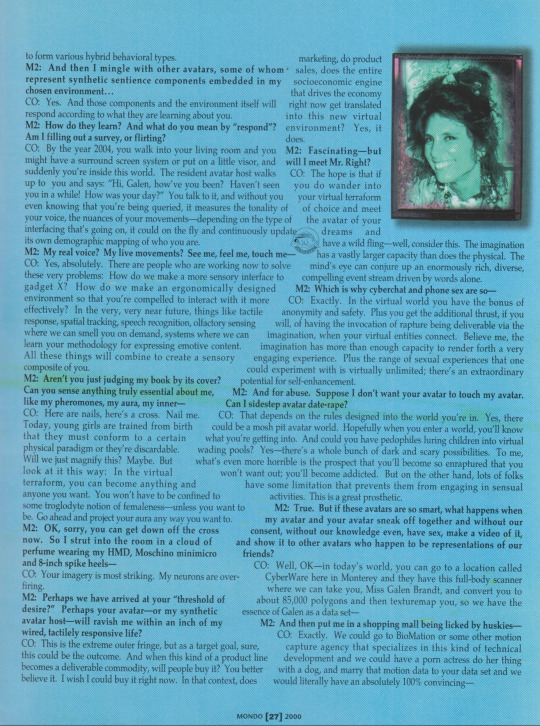
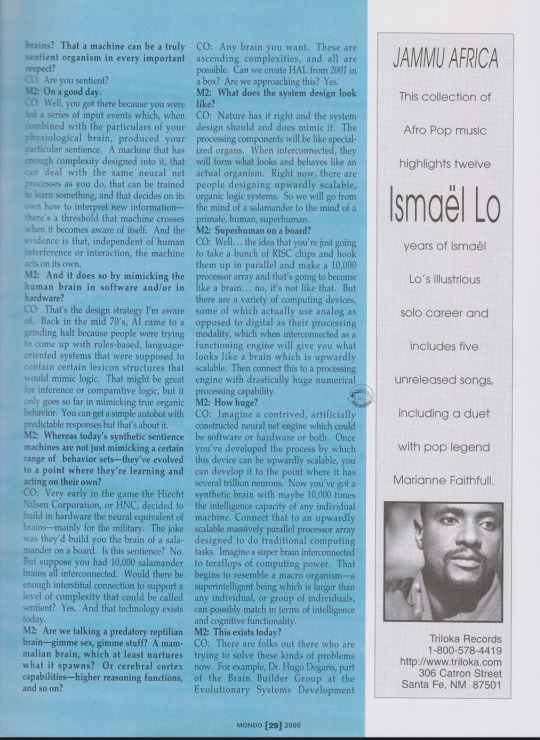
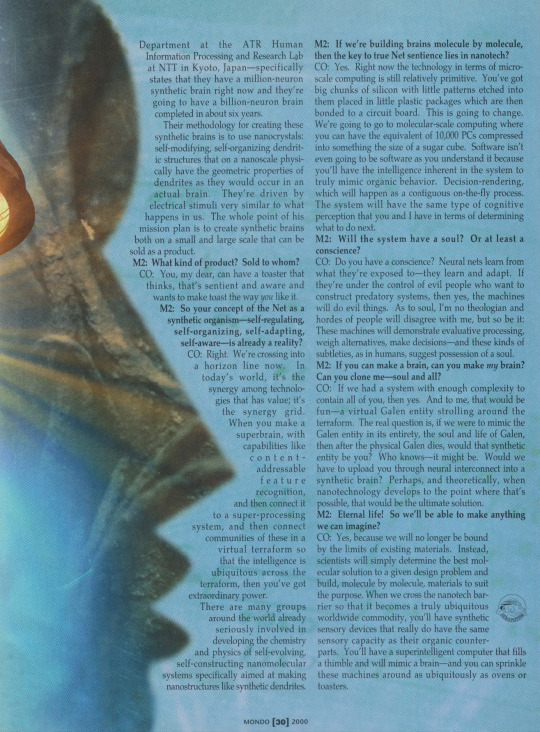
Pages from MONDO 2000 (Issue 16 c. 1996)– a 90s cyberpunk magazine in which science editor Charles Ostman was interviewed about “Synthetic sentience” (AI and the like)
2 notes
·
View notes
Text












Mondo 2000 was a glossy cyberculture magazine published in California during the 1980s and 1990s. It covered cyberpunk topics such as virtual reality and smart drugs. It was a more anarchic and subversive prototype for the later-founded Wired Magazine.
Link to scanned issues here (via)
2 notes
·
View notes